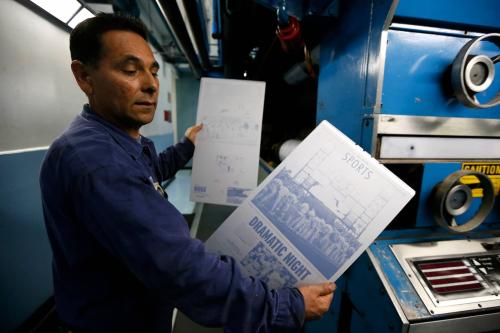Iran’s president, Hassan Rouhani, will mark his first full year on the job next week, amidst troubling signs that his campaign pledge to solve Iran’s most serious challenges may be facing new obstacles. The latest bad news from Iran was last week’s confirmation that Washington Post correspondent Jason Rezaian, who holds American as well as Iranian citizenship, and three other journalists had been detained.
Coming only days after negotiators from Iran and six world powers were forced to extend the nuclear talks for an additional four months due to major unresolved difference between the sides, these developments raise questions about Iran’s prospects and whether moderation of either its foreign policy or domestic environment remains a realistic near-term possibility.
The storyline is troublingly familiar: there are at least three American citizens missing in Iran today, including two Iranian-Americans imprisoned unjustly, former Marine Amir Hekmati and Christian convert Saeed Abedini. And Rezaian’s arrest summons to mind a slew of prior incidents involving individuals with American, Canadian or European citizenship, including hikers Sarah Shourd, Shane Bauer, and Josh Fattal, Woodrow Wilson Center scholar Haleh Esfandiari, academics Kian Tajbakhsh and Ramin Jahanbegloo, and journalists Maziar Bahari and Roxana Saberi.
The list goes on and on, and if it were extended to include Iranians arrested without cause simply for reporting the news or speaking their minds or associating with foreigners, the list would be so long that it would crash this website.
Still, Washington pays particular attention whenever one of its own is seized in the sole country on earth where we have no direct diplomatic presence. There will be crisis meetings in various government offices to discuss what can be done, although the truth is that these cases perhaps come closest to confirming Ayatollah Khomeini’s most famous aphorism: ‘America cannot do a damned thing.’ When an Iranian-American is seized by the system, the world’s sole superpower is forced to fall back on the least satisfying instruments of diplomatic influence: eloquent statements from the podium, third-party consular inquiries, and quiet efforts through cooperative interlocutors.
These efforts can have an effect, however, and past prisoners, including both Esfandiari and Bahari, have reason to believe that public attention and continuous pressure on Iranian officials about their status helped expedite their freedom. So despite the many other issues at stake with Iran today – the nuclear negotiations, the threat to Iraq, the devastating conflict in Syria – every opportunity must be taken to press Tehran to release Jason Rezaian and his wife Yeganeh Salehi, who is also a reporter writing for the UAE-based The National, and two colleagues whose names have not been confirmed by their families.
Each time a dual-national is arrested in Tehran, the media and the blogosphere seem determined to find an explanation. Why was this individual seized at this particular moment in time? What message are Iranian authorities trying to send with this arrest? Is this a move against Rouhani? A hard-liner gambit to undermine the nuclear talks? A warning to steer clear from a particular news story or professional association?
The search for understanding is a natural one, given the opacity of the Iranian system: we are all simply trying to divine political intent from headlines and speeches and clerical Kremlinology. In these arrests, however, I would assert that there is no hidden message, no method to the madness other than unpleasant realities of authoritarian power.
The simple explanation is this: the arrest of innocents and the routine violation of human rights in Iran are a function of this ruling system. Despite the sophistication of its society, the vibrancy of its debates, the trappings of competitive and representative politics, at the heart of the Islamic Republic is a police state. If its agents want to grab you, they can and they will and they need no excuse. Multiple intelligence and security organizations control a prison system whose reaches are not known to even its parliament and whose abuses are infamous. No one, not the most innocuous Western tourist or the most well-connected Iranian power-broker, is immune to its reach.
That this police state can coexist with institutions that lend the system some measure of popular legitimacy is the Islamic Republic’s secret strength and an explanation for its endurance; that these instruments of surveillance and repression have withstood episodic confrontations by an educated and engaged citizenry remains the real tragedy of the revolution.
There is no logic to last week’s arrests, or any of their antecedents, and certainly no justification. In seven short weeks, the annual meetings of the United Nations General Assembly will gather hundreds of world leaders in New York. If past is precedent, Hassan Rouhani and his well-liked foreign minister, Mohammad Javad Zarif, will be among them, and their visit will include a series of cozy sessions with journalists and think-tankers and fawning expatriate audiences.
At every stop, they should be pressed to ensure the release of Jason, Yeganeh, their colleagues, and the other Americans and Iranians unjustly imprisoned in Iran. For those participants who may hesitate for fear of jeopardizing an Iranian visa or access to Iranian officials, don’t be too concerned. After all, the long arm of the Islamic Republic has already assembled a thick dossier on each of us.



Commentary
Imprisoning Americans: Iran’s Outrageous Arrest of Another Dual National
July 28, 2014